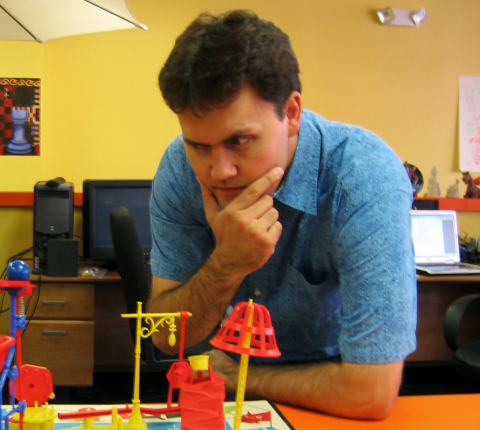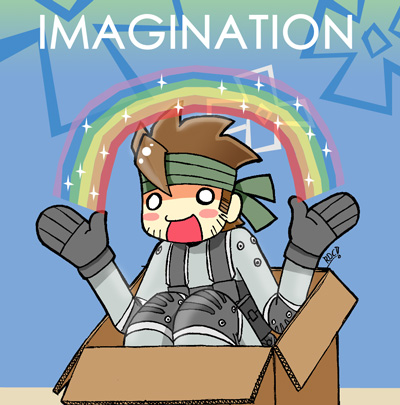What Does A Game Designer Need To Know?

Well, now that we’ve made it clear what game design isn’t about, let’s look at what it is about. The bad news is that there’s no single established method for teaching someone everything about designing games, however there is one man who in my opinion seems to have risen above all others in teaching game designers what they need to know; this man is Jesse Schell and he’s the author of the book ‘The Art of Game Design’.
I’ll get back to singing my praises of Schell and his writings later on but for now let’s concern ourselves with some of the skills Schell tells us a person needs to be a game designer. Schell lists nineteen specific fields that people should learn from if they want to become a game designer: Animation, anthropology, architecture, brainstorming, business, cinematography, communication, creative writing, economics, engineering, history, management, mathematics, music, psychology, public speaking, sound design, technical writing, and visual arts. If you’re thinking that sounds like a ridiculous amount to learn you’d be right, but it may be even more mind-boggling to understand how all these separated areas of study could possibly relate to game design. I’ll do my best to explain why it’s necessary for a game designer to cram all of this knowledge into their brain, but personally I found that even after it was explained to me, my full realisation of why it was necessary only came after acquiring a slightly deeper understanding through experience.
The “Essential” Skills
I’ve condensed Schell’s list here to make it easier to analyse and I’ve added my own explanations as to why each of these skills are so important. So, without further ado, here are some of the essential skills you need to be a game designer:
Animation, Cinematography, and Visual Arts: Video games are undoubtedly a medium heavily dependent on visuals. Visual elements of games are used to convey information to the player, give the game a specific tone, be aesthetically pleasing, and convey narrative. Learning these skills will help you understand what the right visuals can do for your game and how you should use them.
Anthropology and Psychology: When designing a game, every time you make a decision you have to focus on how it will affect the player, and everything from level designs to reward systems in games are created to mentally manipulate the player in certain ways. What’s more, when it comes to testing out your game you’ll need to be able to get inside the testers’ heads to see what the experience is like for them, and when designing a game you’ll need to know what your target audience want. For these reasons it’s imperative that you know how humans and the human mind work.
Architecture: Again, you’ll be designing levels and with most modern games you’ll have a hell of a lot of level designing to do. As Schell puts it “understanding the relationship between people and spaces” is a very valuable skill for creating your in-game environments.
Brainstorming: A video game is a conglomeration of a massive number of ideas. This is the first thing on this list that is a more of a straight skill than something you can research, but we’ll come back to coming up with new ideas in a bit.
Business: There is no need for any game designer to suck up to the corporations, but if you’re making games for an industry it’s best to know some basic things about how that industry works.

Communication and Public Speaking Skills: You will need to present your ideas to people in a confident manner, convey instructions to people on how your games should be created, be able to intelligently discuss your game, and perhaps most important of all be perceptive to feedback on your designs. For all of these things you’ll need to know how to interact effectively with people.
Computer Engineering: As a video game designer you’re going to see your work brought to life through computer technology. Understanding what you can and can’t do with computers will be a defining part of what you create.
Creative and Technical Writing: You will be creating fictional worlds with every new game, for which you will need creative writing, while you will need technical writing to create documents that describe every aspect of your game designs down to the tiniest detail and convey them to the other members of the development team.
Economics: When you think of economics in games you probably just think of monetary economies in MMORPGs, however within all game worlds you will have exchanges of points and resources, and some knowledge about how these kinds of exchanges can work will help you learn how to create the systems that concern these exchanges. The branch of economic theory known as game theory can be a subject of tremendous value to designers.
Management: I know I said you were not the boss and that’s still true, however Schell considers “secretly managing from below” a realistic means to help push the development of a game in the right direction when the real management aren’t doing their job properly, and so it seems reasonable to learn at least some management skills.
Mathematics: From the AI weighing up its attack plan to complex damage calculations, games are made up of a huge quantity of interconnected mathematical and logical systems. Without an ample knowledge of how to create these systems you’re not going to get far in the world of game design.
Music and Sound Design: Of course you won’t be making the music but sound is important for evoking emotion, communicating information to your player and giving them the feeling that they’re part of a realistic world.
History: You’ll be working with fictional worlds in your profession and so it’s important that you understand how a world ticks. History will give you a good basis for this.
As you can see that’s a huge amount to learn but as I said, at this point it still might not make complete sense how all of this will tie back into game design, and there may also be some aspiring designers out there who have got by fine so far without a lot of this information, but working in the industry itself is highly demanding. Not all information from all the subjects listed there will be of direct help at all times, but all knowledge is related, and there are going to be a lot of knowledgeable people contending for the job of game designer, the more you know the greater the games you can create and the better your chance of beating them all to it. However, the more astute readers among you may have noticed that I didn’t say that list comprised of all the knowledge and skills you need to be a game designer, I simply said it referred to “some” of the things you needed. So, what else can you learn that will be of use to you?
Sparking Your Imagination

Unfortunately no matter how intelligent you are you can’t really just sit down with a pen in hand and come up with the next fantastic idea for the video game industry, and that’s where our next concept comes into play: Inspiration. Throughout history whenever people have produced substantial creative works they’ve needed inspiration to work with.
So, from this point of view the answer to the question of what else can you learn that will be of use to you is essentially anything and everything. A good game designer is someone who is always learning and is regularly experiencing new things. I don’t just mean that you should take inspiration from other video games either, look at all forms of art and entertainment, as well as your own experiences, the world around you, and the studies of the world. It is this knowledge and these experiences from which you can draw the ideas you need to create. Some even recommend that you carry around a notepad or tape recorder so that you can record your inspirational game design ideas on the fly during your day, and sort through them when you have the time. This may sound crazy but a lot of good game designers are crazy, if this kind of thing sounds of use to you just go with it.
The Vital Trait
So, we have a list of essential knowledge and skills, we know that we need inspiration, but there’s still one piece missing from the puzzle. As silly as this might sound, with any profession if you want to excel you need a love of the job. You could learn all the skills and acquire all the knowledge you need but until you actually try game design you won’t really know if you love it. If you do have a love of game design, it will not only mean that you enjoy what you do, but it will also be the thing that gives you the willpower to do the work you need to be a game designer, and be the way you imbue your work with the kind of creativity that can only come from someone who is passionate about what they do.
End of Part 2
Once again, thanks for reading. Good luck, have Batman.-Gamer_152
Log in to comment